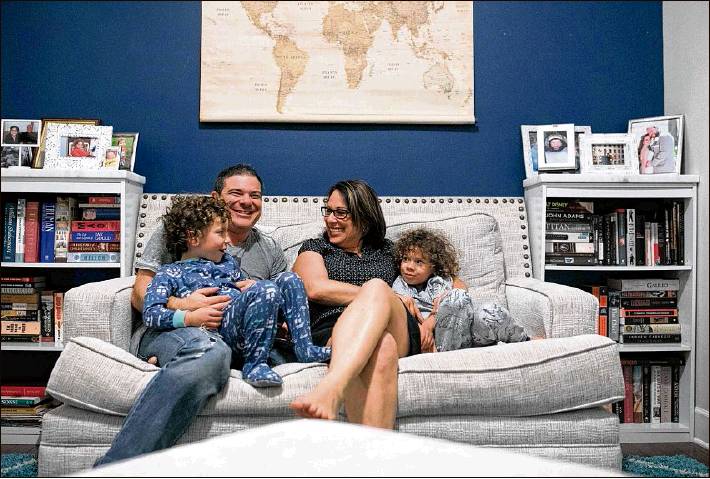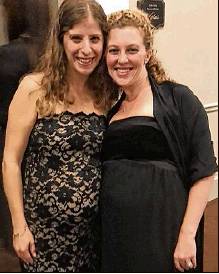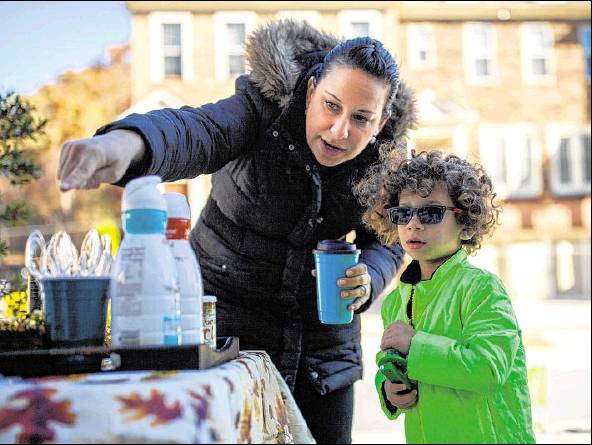SUPPORT PROGRAMS
Group helps women with fertility issues
Atlanta-based Jewish Fertility Foundation uses ‘buddy’ system.
By Shelia M. Poole spoole@ajc.com
Elisheva Engler and her husband were married more than two years when the comments started.
So, when are you guys going to have kids?
Don’t wait too long.
Are you trying?
Engler, who was in her late 20s at the time, was frustrated and, sometimes, hurt, particularly since the young couple was trying to have a family.
“They just have no idea how sensitive the situation is,” said Engler, a former general manager of a kosher catering company. “The assumption is that once you’re ready to have kids, it’s an easy task. You get pregnant naturally, and you have the baby. Unfortunately, that’s not the case with everyone. You’re doing everything you can, and you still come up empty. The struggle is very real, and it’s tough.”
Today, Engler — who is now pregnant with her third child through in vitro fertilization, or IVF, wants to help other Jewish families who are experiencing infertility problems. She is a mentor for Fertility Buddies, a program run by the Atlanta-based Jewish Fertility Foundation, which provides financial assistance, educational awareness and emotional support to Atlanta Jewish families who have medical fertility challenges.
Sometimes the best way to help “is to talk to people who know what it’s like to have multiple shots a day, who have multiple appointments a week, who know how it can affect relationships and finances,” said Engler, 34. “There’s nothing like being able to talk to someone who can say, ‘I totally get it.’ ”
About 12 percent of women in the United States ages 15 through 44 have difficulty getting pregnant or staying pregnant, according to the Centers for Disease Control and Prevention. Infertility, though, is an issue with both men and women.
Executive director Elana Frank founded the program more than a year ago.
“Family-building is so integral to Judaism,” she said. “From a very early age in Jewish families, everything is centered around family. It’s assumed you’re going to get married. It’s assumed you’re going to have children. ...”
“During Passover, there’s a tradition — a family ritual — where you sit down and share the story of the Exodus of the Jews,” she said. “What happens when you’re sitting there, and you don’t have children? You feel like all eyes are on you.”
Currently, about 43 men and women are involved in the buddy program.
Frank knows firsthand the roller coaster ride of hope, frustration, excitement and disappointment. For more than a year, she and her husband, Jason, tried to have children. They were living in Israel at the time. She started taking Clomid, a medication that is commonly used for the treatment of infertility. Then she started going to the basement of a well-known doctor’s home office where she underwent intrauterine insemination. That didn’t work, and they were paying out of pocket.
“It was really a horrible period,” said Frank, who has a background in nonprofit management. “Literally, we didn’t know anybody going through this. I felt so alone.” She didn’t want to go to synagogue and avoided children’s birthday parties because it was too hard to watch children running around. She was happy when friends announced their pregnancies, but sad at the same time.
Her aunt recommended she see another doctor, who determined that she was unable to get pregnant because her tubes were blocked. Eventually, Frank and her husband had two children.
Coincidently, Engler — a mentor — and her buddy Jennifer Coplin, a 33-year-old Smyrna accountant, are pregnant at the same time.
Once, Coplin received a giant box of medication and equipment with little instruction on what to use and when.
She reached out to Engler who helped explain how to store and use the medication.
Engler helped her navigate doctors appointments and medications, provided emotional support and helped her juggle her work schedule.
Another Fertility Buddies participant, college professor Sara Schwebel, 42, lives in Columbia, S.C., but her “buddy” lives in metro Atlanta.
Schwebel, who is single, would love to have children, but so far hasn’t been able to conceive.
She says the program has been like a gift to her.
“Anyone who has struggled to build a family knows it can be an excruciatingly lonely, difficult journey,” she said. In the Fertility Buddy program, Schwebel found that emotional support she needed.
“They remember what it was like to be in the throes of the journey in ways that other people who haven’t are not capable of doing,” she said. “Only someone who has been through the seemingly endless testing, treatments and waiting for someone to call you back would understand.
“When I call the fertility foundation, everyone calls me back immediately,” she said. “They don’t want to leave me alone for a second. They don’t want me to wait, again.”


